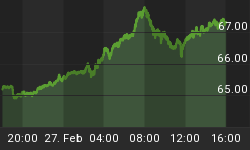In the bear market struggle for control, authoritarians often have the upper hand over anti-authoritarians for a very simple reason: Government is usually the authority. Also, as Alan Hall's study (April and May 2010, The Socionomist) makes clear, in the early days of a negative mood shift, citizens often welcome the state's controls.
How are the trends identified and forecast in Hall's study working out in the U.S.? The issue of entrapment/informants is a powerful case in point of the government's widening authority. It includes all of the elements of pre-crime: The emphasis on prevention over investigation, the tolerance of false positives and the willingness to sacrifice individual liberty on behalf of indiscriminate state power.
I'll get right to the specifics. The world's best-known police agency -- the U.S.'s FBI -- has shifted its focus from law enforcement to domestic spying via informants. Here are just some of the facts.
-
In the aftermath of 9/11, the FBI was painfully aware that it lacked intelligence analysts and linguists, and knew it was equally short of Arabic speakers and contacts in the American Muslim community. Thus one of the bureau's early steps was to create its own in-house "National Security Branch." It then hired away a top executive from the NSA and another one from the CIA (agencies which are forbidden from domestic spying).
-
In turn, the former NSA official created intelligence units in every one of the FBI's 56 field offices; the former CIA executive's task was to carry out a "plan to reinvent the crime-fighting agency to take on terrorism." A 2006 New York Times article described "his guiding premise: that arresting bad guys is sometimes less important than collecting intelligence to uncover the next terrorist plot."
-
As of 2011, the FBI's mission change appeared complete. Counterterrorism accounts for $3.3 billion of its annual budget, while only $2.6 billion goes to organized crime. It maintains "Joint Terrorism Task Forces" with more than 100 state and local governments nationwide.
-
Perhaps most notably of all: "The bureau now maintains a roster of 15,000 spies, some paid as much as $100,000 per case..." This dwarfs the size of the FBI's informant program during the 1960s and 1970s.
For our purposes, the definition of an informant (or domestic spy) is straightforward: a person who receives money, or a reduced criminal sentence, or the promise not to be deported, in exchange for helping the FBI identify or stop a terrorist action. Meanwhile, the FBI has aggressively used the informants to "target not just active jihadists, but tens of thousands of law-abiding people, seeking to identify those disgruntled few who might participate in a plot," according to Mother Jones.
In the years since the FBI shifted its focus away from fighting crimes and toward domestic spying via informants, public records show that the bureau's efforts have led to the prosecution of 508 alleged domestic terrorists (as of August 15, 2011, according to a report from Mother Jones and the Investigative Reporting Curriculum of the University of California, Berkeley).
Given its multi-billion dollar budget and the scale of the spy network, that number of prosecutions may or may not be enough to regard the FBI's informant program as a "success." Part two of this article will post later this week, and review some of the particulars regarding those prosecutions.
Until then, consider subscribing to The Socionomist. Doing so gives you full access to the publication's archives as well as regular socionomic coverage of the authoritarian/anti-authoritarian battle as it develops. Follow this link to begin.
Andrea Dibben contributed research.
If you would like to receive the best of Social Mood Watch and other free socionomics content each week, sign up here.
This article is syndicated by The Socionomist, a publication of the Socionomics Institute, and was originally published under the headline Why G-Men Convert to Spies: The Means, Motive & Opportunity (Part I). The Socionomist is designed to help readers understand and anticipate waves of social mood. Copyright © 2012 Socionomics Institute.















